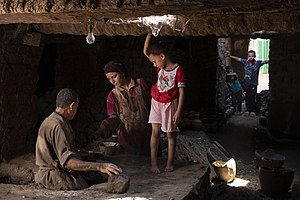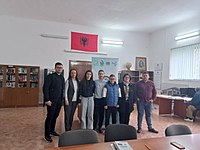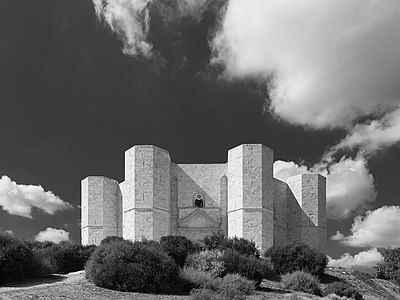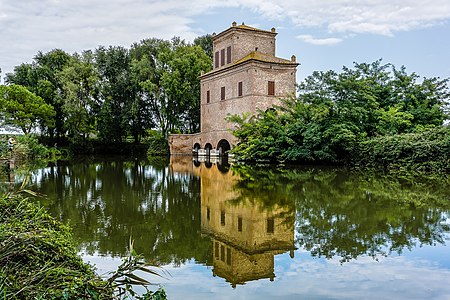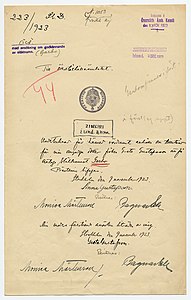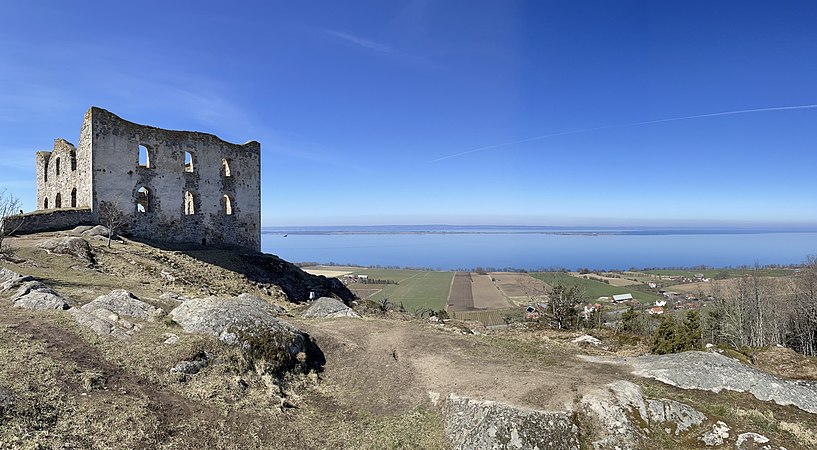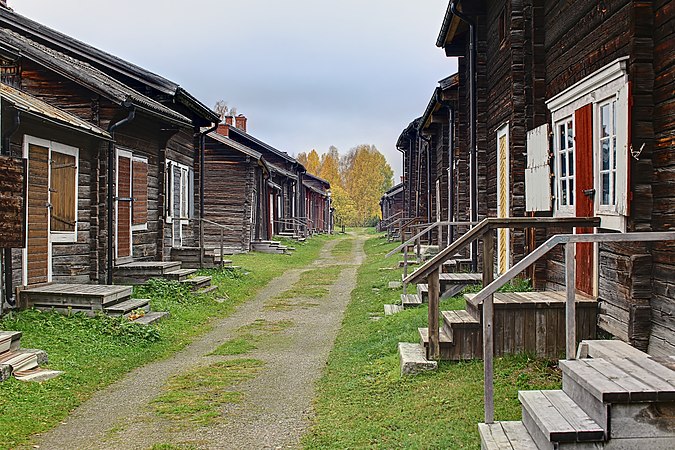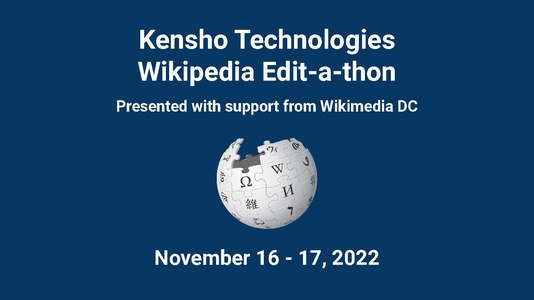GLAM/Newsletter/November 2022/Single
Wiki Loves Africa 2022 Winners & 2022 ISA Drive
Wiki Loves Africa 2022: Winners Announced!
Wiki Loves Africa is the annual continent-wide competition that shifts the visual narrative of Africa by encouraging people to contribute Africa-relevant photos, video, or audio to Wikimedia Commons. The 2022 theme was Home&Habitat, and judging by the 16,265 entries received, it spoke to creative minds across Africa and beyond.
After months of deliberation, our international panel of jurors created a shortlist of the Top 20 images. You can watch this video presentation of the Top 20 on Wiki in Africa's YouTube channel here] or to the right.
From this shortlist, the jury has chosen the following exceptional images, a photo essay of Windows and a heartfelt video as the Wiki Loves Africa 2022, international winners.
Wiki Loves Africa 2022 Photography Winners
-
1st Prize US$2000.: A Nubia A Nubia by Summering2018 (Egypt)
-
2nd Prize US$1500: Home is my Work by Mohamed Hozyen (Egypt)
-
3rd Prize US$1000: Planning Ahead by Ayorinde Ogundele (Nigeria)
Wiki Loves Africa 2022 Video Winner
Wiki Loves Africa 2022 Special Collection Prize
This year a US$750 prize is awarded to a collection of images that tell a story. This year, the jurors felt User:Myousry6666 photo essay Windows Stories was poignant and beautifully executed. See all images from the Winning Special collection.
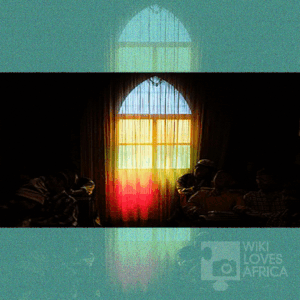
Congratulations to all the winners!
Wiki Loves Africa 2022 ISA Drive Now On!
The Wiki in Africa ISA campaign, which centres around adding metadata to the images uploaded in the 2022 Wiki Loves Africa competition, aims to address this issue. Our award-winning ISA tool makes adding descriptors to images easy and seamless.
However, in the past, we've noticed some issues with the way people describe images. In response, we've written a Depiction Guideline article to guide people when adding structured data to Wikidata here.
The richness, diversity, and beauty of Africa deserve to be visually celebrated on Wikipedia. YOU can help to do this by describing images for the ISA campaign. Everyone is welcome to participate!
Join the campaign here!
An event at the National History Museum in Tirana
An event at the National History Museum in Tirana
For the November National Celebrations, WoALUG organized an event with the National History Museum in Albania. Since we wanted to celebrate two important historical dates, 28-29 of November, which are the Independence Day and National Liberation Day in Albania, WoALUG arranged a day in the National History Museum to raise awareness about the history and why it is important to write and expand articles on Wikipedia for these historical dates.
For this event, we collaborated with the GLAM and Educational programs partners, the National History Museum in Tirana, and 2 high schools in Elbasan.
Students had the opportunity to visit pavilions of the Independence and National Liberation Day, talk about the history, and be informed by a well-known history researcher, Jaho Brahaj. At the end of this event, we discussed the importance of the historical facts, content, and information on Sq Wikipedia, asked and answered questions about the struggles they face when writing articles about history.
Being in the month of major historical celebrations, our school partners and teachers are organizing activities during this month regarding article writings about the Independence and National Liberation Days in Albania and the museum.
Below are some pictures from the event.
Collaboration with Qemal Baholli Library in Elbasan, Albania
In 2022, Wikimedians of Albanian Language User Group planned a series of meetings with the Albanian audience to meet up at different GLAM institutions in Albania.
Recently, we collaborated with the Qemal Baholli Public Library in Elbasan and organized an event for Independence Day. Manjola Hatellari, the director of the public library, talked about the books that can be found in the library regarding the history of Independence Day. She also read a meaningful paragraph from the independence declaration of Elbasan city.
On the other hand, WoALUG talked about the importance of Wikipedia articles over traditional library information and the strong relationship between Wikipedia and the library. Our audience shared the challenges and what they learned while writing or editing articles on Wikipedia.
We are eager to continue working closely with the library for more follow-up meet-ups and activities to raise awareness of using and editing Wikipedia frequently. This way we push Wikipedian contributors to use the library as a source of information and to cite books in the articles.
Below are some pictures from the event.
Social Media channels:
wikimediashqip.org, @sqwikimediansug, FB/sqwikimediansUG, ig/sqwikimedians_ug Youtube channel Wikimedians of Albanian Language User Group
WLM tool, Wiki Takes, New WMB's Strategy, and 2 new GLAMs

First of all
Help Wikimedistas de Uruguay to concieve the best GLAM Wiki Conference of all in November 2023 in Montevideo, Uruguay.
Please fill in the survey no later than January 15 and spread the word among your communities.
Tool for Wiki Loves Monuments

Wiki Movimento Brasil developed an interactive, mobile and bandwidth-friendly application for Wiki Loves Monuments participants to discover the monuments around them and send images directly from the app. It was inspired by the Monumental map application, but built to require low bandwidth for mobile users, that compose the majority of the internet users profile in Brazil. The tool, called Wiki Loves Brasil, is available in Toolforge and had more than 3 thousand images uploaded by 24 users during the contest in September. Tests of functionality were made with organizers of WLM contests in other countries, namely Suriname (wlmsu) and Portugal (wlmpt). This is the first step towards full integration of Wikidata with the contest.
The app allows users to send photographs, geolocate and suggest monuments near them. Other features are planned to be developed for next year's competition: the user dashboard for participants in photographic contests, such as WLM, WLE and WLF, is the highlight. That particular feature will be developed with an outreachy internship project called Develop features for Wiki Loves Monuments App.
Wiki Takes São Carlos

Wiki Takes São Carlos was an initiative to increase the amount / quality of information about the city of São Carlos, settled in São Paulo State, available in Wikimedia projects in Portuguese. Fundação Pró-Memória de São Carlos (FPMSC), the governmental agency responsible for the cultural heritage preservation, listed around 500 buildings as "of historical interest", because they are settled in the historical center of the city. This was a huge challenge for Wiki Take's team, but we documented more than half of them during a three-days-photowalk, as you may see below in printscreens of WLM app. Before Wiki Takes, the city had only 4 historical buildings with pictures in Wikimedia Commons.

During the event, we:
- Uploaded a new batch of 799 new images from our GLAM-Wiki partnership with NELAC, most of them depicting historical coffee plantation buildings;
- Took photowalks to document the historical downtown, producing 2,333 imagens;
- Mapped all the listed historical buildings in OpenStreetMap, linking them to WikiData items;
- Organized an edit-a-thon about the city, creating 7 new articles and improving other 27: 140KBytes Added.
Wiki Movimento Brasil Strategy 2023-2025

The Wiki Movimento Brasil (WMB) Strategy defines and guides WMB' s agency on the activation, coordination and social transformation of open knowledge. The axes of this strategic planning, to be implemented between 2023 and 2025, are:
- (Re)imagine the sociotechnical infrastructure of the Wikimedia Movement
- Coordinate Brazilian Wikimedia agencies
- Foster and diversify partnerships for open knowledge in Brazil
- Promote knowledge equity
- Deepen and direct networks of governance within the Wikimedia Movement
This document is the result of a year-long strategic process organized by Wiki Movimento Brasil, started on November 1st 2021. The application of this planning begins in 2023 and hard a trienio. The implementation of this plan begins in 2023 and will continue for three years. The document was approved on November 2nd 2022, at the General Assembly of Wiki Movimento Brasil. The research, drafting and consolidation methodology is available for consultation. A glossary of key-terms is also available for consultation.
GLAM initiatives during this period (2023-2025) will be aligned with all the axes of Wiki Movimento Brasil (WMB) Strategy. Our main guidelines will be to geographical (out of Rio de Janeiro - São Paulo axe), ethnic and culturally (focusing on underrepresented communities) diversify GLAM-Wiki partnerships (axe 3), and, consequently, to promote knowledge equity as hard as possible, by the listening of the needs, the articulation and the support to people and institutions, providing equitable / healthy / friendly spaces of decision-making (axe 4). Some expected results are the outspread of local and autonomous governances and agencies and also the emergence of interwiki projects based on the collaboration among our GLAM partners (axe 2). We also want to identify mutual challenges with regional and global communities contributing to the strategic processes of the Wikimedia Movement (axe 3), always keeping one eye on the technological needs, sharing processes and helping each other to improve the access to open knowledge and the user experience on-Wiki (axe 1).
Two New GLAMs

Centro de Memória do Curso de Enfermagem da UFES
Centro de Memória do Curso de Enfermagem da Universidade Federal do Espírito Santo (UFES) (in English: Memory Center of Nursing Undergraduation Course) is the memory unity of the nursing undergraduation course at w:Federal University of Espírito Santo (UFES), created in 2009 to preserve and value the history and the memory of nursing in the state of Espírito Santo.

Centro de Documentação e Memória Regional
Centro de Documentação e Memória Regional (in English: Historical Documentation and Regional Memory Center) is a unity of State University of Santa Cruz created in 1993 for the preservation of regional memory. It gathered unique collections of newspapers, photos, videos and academic publications about the regional history and culture of Ilhéus-BA.
Big upload of the month

Two Open Culture films on India's Odia language, made with volunteer labour
"The Volunteer Archivists": A film about a volunteer group's 16-year-long journey of archiving 200 years of printing
Srujanika was founded as a volunteer-led collective by scientist couple Nikhil Mohan Pattnaik and Puspashree Pattnaik in Bhubaneswar, Odisha, India, in 1983. Since 2006, its workforce of only a handful of volunteers has managed to collect, process, and archive 10,000 volumes of books, magazines, and other periodicals and dictionaries published in the Odia language since the early 1800s. These publications are hosted on their portal— Odia Bibhaba. Their story forms the basis of the Open Culture documentary film "The Volunteer Archivists" (2022, colour, 40 min, directed by Subhashish Panigrahi).

Srujanika's original goal was to promote science among children outside of textbooks. Public schools in Odisha, where Odia is an official language, saw a shortage of teachers and teaching aids, leaving little room for hands-on science experiments. Srujanika's efforts helped create a large state-level community of students and teachers and a culture of science-making outside the classrooms. Students not only learned how to use everyday objects, from dry leaves to refills of ballpoint pens that would otherwise be thrown in a garbage can and learn what they are taught in science classes, but they also became mentors to their juniors. Srujanika also published a monthly magazine called "Bigyana Tarang" from 1988-1989, and many illustrated popular science publications for which they had to refer to existing science articles in Odia. Their own necessity pushed them to collect many rare books, magazines, dictionaries and other publications in Odia. As scanners became affordable, they started archiving, starting with the Purnnachandra Ordia Bhashakosha, the seven-volume 1930-1940 lexicon that powers the Odia Wiktionary.
Srujanika has also contributed to the Wikimedia movement, directly and indirectly, over the years. In 2021, the Odia Wikimedians User Group collaborated with them for a book archival project leading to the archiving of 101 titles. Their long-term contribution for localising computing terms into Odia and standardising their use, including the collaborative publication of the guide manual "Computer Translation Style & Convention Guide For Odia" has been helpful for the Wikimedia community for localisation of Wikimedia system messages. Similarly, their [pioneering work for solving encoding conversion of typed text in Odia was furthered by the Wikimedia community for building more robust converters that are now widely used for Wikimedia projects and also by the general public.
The 40-minute-long film, along with the main footage, b-rolls, stills and other supporting materials, was released under a Creative Commons Attribution-ShareAlike 4.0 International (CC BY-SA 4.0) License and a DVD version is available physically at the US Library of Congress. Watch the film here or browse the other materials here, many of which can also be used for Wikipedia articles and other Wikimedia projects.
"Nani Ma": Documenting early 1900s register of Baleswari dialect of Odia
Released on the fifth anniversary of Musamoni Panigrahi, the late community elder and storyteller from Balasore district in the Indian state of Odisha, the documentary "Nani Ma" chronicles her stories and songs. It is also a massive speech data repository depicting the early 1900s register of the Baleswari dialect of the Odia language which is hardly documented in the audiovisual medium.
The aftermath of the manmade 1866 famine of Orissa, stemming from the British Raj and the poor administration of local administrators, resulted in the death of over a million people. The grave impact of this tragedy got embedded in the folk songs, folklore, and folk literature of many generations. The central dialect of Odia became the focus of a linguistic revolution which would help create the state of Orissa in 1936 as India's first state to be formed based on language. But this nationalistic movement and the literary initiatives left other dialects and many indigenous languages of the state unattended.
Born in the 1920s in a tiny coastal hamlet in the Balasore district of Orissa, Panigrahi never received formal schooling. Her early marriage also brought her an early widowhood, a personal tragedy leading to her embracing Mahima Dharma, a faith system founded and led by indigenous and marginalized Adivasi and Dalit leaders. For the first time, narrations of her era and the linguistic register of that era are documented as multimedia recordings through this film.
The entire footage and supporting multimedia files used in "Nani Ma" are now available on the Internet Archive under a CC BY-SA 4.0 License, and the film will be available to the general public after screening in film festivals.
Open GLAM Conference; Sundanese Wikisource Workshop; Minangkabau books digitization
Open GLAM Conference

In November 5th, Wikimedia Indonesia held Open GLAM Conference in Jakarta (news item, archived), a two-day event which attended by around 40 GLAM activists around Indonesia. In this main event of 2022, participants talks and learn in 10 sessions about Wikimedia & GLAM Indonesia, Wikidata, licenses, Retas Budaya ("Hack your culture"), Wikistories, open access, Wiki Rescues Manuscript, as well as panel session UNESCO's Memory of the World, and Wikibase session by Alan Ang.
Our conference aim to connect like-minded GLAM institutions around Indonesia, to provide them with the necessary knowledge and resources to open their collections, and to emphasize the need for openness, be it license, access, as well as data. Participants came from all major islands of Indonesia, from various background and affiliations, with speakers hailing from University of Indonesia, Creative Commons Indonesia, Goethe Institute, Wikimedia Foundation (WMF), Wikimedia Deutchland (WMDE), UNESCO, Masyarakat Pernaskahan Nusantara (Manassa), DREAMSEA, Arsip Nasional Republik Indonesia (ANRI), Indonesian Visual Art Archive (IVAA), as well as host Wikimedia Indonesia (WMID).
Subsequently, Hardi, representing GLAM Indonesia, presented our GLAM activities in ESEAP Conference (18-19th November) in Sydney, Australia. (1)
Sundanese Wikisource Workshop
Following a similar workshop last month, the Sundanese community requested a WikiTraining and Wikisource Workshop for their language. Sundanese Wikisource currently still hosted in Multilingual Wikisource. But the influx of new contributors could led the project to see the light of day, and approved as an independent project, the fourth of its kind in Indonesia, after Indonesian, Javanese, and Balinese Wikisources.
The workshop is held online, with around 12 participants. They proofread a Sundanese book called Dongeng-dongeng Pieunteungeun with the help of an experience Sundanese Wikisource contributor: User:Kumincir. Their contributions can be seen here.
Minangkabau books digitization

Our partner institution in West Sumatra, the Balai Bahasa Provinsi Sumatera Barat (BBPSB, West Sumatra Province Language Center), has agreed to open their Minangkabau language collections and upload them to Commons. This included two batches of books, one set are older books (around 50 of them), which required to be digitized first, and another set of 27 newer books, in bilingual Minangkabau-Indonesian. We provide (lend) them with a scanner (a Fujitsu ScanSnap), trained them how to digitize their books, and post-processed the resulting images into PDF using ScanTailor and Sumatra PDF softwares. Each of them then tried their hand using the machine, and spend the second day processing the images into PDF, and upload them to Commons. These collections can be seen/downloaded from Category:Balai Bahasa Provinsi Sumatera Barat.
Among the books that they uploaded, there's one title, about Minangkabau folk story of an unfilial son called "Umbuik Mudo". The story has been proofread in Indonesian Wikisource previously in the form of Malay retelling of the story, called "Tjerita Si Umbut Muda", and the story in the original language was not available until BBPSB uploaded their collection; one book called "Hikajat Si Umbuik Mudo" in original Minangkabau language, and another called "Si Umbuik Mudo", a bilingual Minangkabau-Indonesian book for the new generation of readers.
Video and photo to share the beauty of Italy's heritage
Opening archives to Wikimedia projects: video in collaboration with cultural institutions
This month's new about the collaboration with TCI is the creation of a video shot inside the TCI Historical Archives, able to reach an even wider audience. Wikimedia Italia and Touring Club Italiano share in fact the desire to tell, document and share the beauty of Italy's heritage. Hence the three-year agreement to make digital reproductions of some nuclei of the TCI Historical Archives' collections accessible.
Click here to watch the full video: https://www.youtube.com/watch?v=CGnzzBLhe04
Two other important videos are scheduled to be released in the coming months: the first shot at the Museo Egizio (Egyptian Museum), with whom there is an ongoing - in collaboration also with Creative Commons Italy - and the University of Padua, with whom Wikimedia Italy has been collaborating for several years with great results for the Wikimedia projects.
Wiki Loves Monuments 2022
The beautiful Castle of Formigine hosted the award ceremony for the ten finalist photos of the Italian edition of Wiki Loves Monuments, which this year had as its main theme precisely that of Castles and Fortifications. Thanks to the collaboration with Istituto Italiano dei Castelli (February news), for the first time thousands of fortifications that are protagonists of Italian history and landscape were photographed in order to enrich the world's most famous online encyclopedia.
Alongside the ranking of photos of castles and fortifications, prizes were also awarded for the best shots in the general section, where photographers could upload photos of more than 22 thousand monuments from all over Italy.
The winner of the castles and fortifications section is Castel del Monte, with a b/w shot that enhances the fortress in a play of light and shadow. For the first time this year, thanks to the collaboration with Istituto Italiano dei Castelli, this important castle, situated in Apulia, was included in the list of photographable monuments for the contest.
Winning the gold medal in the general section, however, is the Biblioteca Civica Centrale di Torino (Central Public Library), a public library established in 1869, that belongs to the Biblioteche Civiche Torinesi library system. Among its collections are important manuscripts produced by Vincenzo Gioberti.
Just in 2022, Piedmont volunteers focused their efforts on documenting Turin's libraries, drawing photographers' attention to busy public buildings; thanks to the work of volunteers in fact in May 2022, the City of Turin has authorized a long list of monuments, libraries and museums that it holds in its custody. These include the Automobile Museum, the Teatro Regio and the Mole Antonelliana, which have been featured in beautiful shots from Wiki Loves Monuments 2022 and best documented on Wikimedia projects.
In particular 21 libraries in the city of Turin were made photographable in 2022: Biblioteca civica centrale; Biblioteca civica Italo Calvino; Biblioteca civica musicale Andrea della Corte presso la Villa Tesoriera; Biblioteca civica Passerin d'Entrèves; Biblioteca civica Bianca Guidetti Serra; Biblioteca Rita Atria; Biblioteca civica Dietrich Bonhoeffer; Biblioteca civica Cascina Marchesa; Biblioteca civica Francesco Cognasso; Biblioteca civica Alberto Geisser; Biblioteca civica Natalia Ginzburg; Biblioteca civica Primo Levi di Torino; Biblioteca civica Don Lorenzo Milani di Torino; Biblioteca civica Cesare Pavese; Biblioteca civica Villa Amoretti; Mausoleo della Bela Rosin; Biblioteca del Polo del '900 in Palazzo San Daniele; Biblioteca dell'Istoreto e biblioteca dell'Archivio cinematografico della Resistenza in Palazzo San Celso; Biblioteca di Economia e Management dell'Università di Torino; Biblioteca Giuseppe Peano del Dipartimento di matematica dell'Università di Torino in Palazzo Campana; Biblioteca di storia e cultura del Piemonte Giuseppe Grosso presso Palazzo Cisterna.
- General section of the competition
- Castles and Fortifications
Linking heritage data at HackaLOD
HackaLOD

On November 4th and 5th, seven teams of historians, programmers, heritage and data specialists locked themselves in the Dom Tower in Utrecht for almost 24 hours to create new applications linking together Heritage information from different data sources. As always Wikidata was one of the popular sources, providing a wealth of both historical and current information. Read more about the projects and winning teams (in Dutch) at the Netwerk Digitaal Erfgoed (NDE) website.
Integrating with the BHL, loading natural science specimens and data
Integrating with the BHL by Prosperosity

The Auckland War Memorial Museum is an affiliate Biodiversity Heritage Library (BHL), ensuring that public domain works related to biodiversity and taxonomy have high-quality digitised versions. The BHL is a wonderful resource, identifying any taxon names in pages of text, and creating a searchable database of every single mention of this taxon in BHL uploads.
This month, we have better integrated our BHL uploads with Wikimedia. Every item in our BHL collection now has a Wikidata item which links back to the full text on the BHL. This means that anyone citing the work using Cite Q will automatically be linked to a publicly available copy of the work, and if a work includes the first description of the species, this can now be more easily referenced through in Wikidata. This also improves the digital footprint of these works.
Continuing on our work from last month, our project has now made 40 articles on native New Zealand mollusc species! This includes Eatoniella mortoni, which was featured on the main page on 25 November as a Did you know item.
Many of these species were first described in museum publications uploaded to the BHL. By using Cite Q to reference these works, we can generate dynamic references based on the Wikidata item. That means that if we improve the Wikidata item (such as adding an OCLC, a DOI, linking to a clearer scan of the publication, or creating a Wikipedia article for an author), this new data automatically populates across all Wikipedia articles that use the template.
Content from BHL works can further be integrated into Wikimedia projects: Wikimedia Commons and Wikisource. Images from the publications can be cropped from the source, added to Wiki Commons and integrated into Wikipedia pages (or any other projects). The BHL works can also be uploaded to Wikisource, where users can collaborate to ensure that permanently available transcribed copies of these texts can be found, as was done this month with Moss's 1908 book Beautiful Shells of New Zealand.
Loading natural science specimens with OpenRefine by Avocadobabygirl

Museum of New Zealand Te Papa Tongarewa has completed a pilot project to share images and information about Aotearoa's native Myosotis species (forget me nots), resulting in a full suite of new articles, Wikidata additions and edits, and metadata-contextualised pictures.
This release built on years of work throughout the museum, which had previously collected, catalogued and photographed these specimens, developed and applied open licensing policies for both images and data, and created a culture of openness and willingness to try new things.
OpenRefine's Wikidata reconciliation and new bulk upload functionality provided the bridge from Te Papa's systems.
Our project team wanted to build up a reusable set of tools and processes so we could share other parts of our collections in similar ways. You can see how we went about creating this toolkit in our blogpost and project documentation below:
- Museology, Myosotis, and metadata oh my! Sharing sustainably in Wikipedia – Te Papa blog
- Myosotis project documentation
Next year we expect to reuse this selection criteria, data mapping, TePapaColl template, OpenRefine schema and all the rest, improving our practices and gradually making them one of our regular ways of doing things as a museum. Feedback – especially suggestions for improvement – is extremely welcome, and let us know if you make use of what we've shared.
Browse the uploaded images at Category:Botany in Te Papa and check Stitchbird2's user page for how new articles are progressing.
How Wiki helps to explore and enjoy art & culture; Wiki workshop for the National Museum in Krakow; GLAM online meeting on ideas for 2023; Wiki Loves Monuments 2022
How Wiki helps to explore and enjoy art & culture

On 30th of November Wikimedia Poland run an online training session on how Wiki helps to explore and enjoy art & culture for International Internship University.
It was a great opprotunity to spread knowlegde on Wikimedia projects and GLAM-Wiki partnerships. The session was streamed live on Facebook and Youtube. A few hundred people from different corners of the world have learned how Wiki helps to explore and enjoy art & culture.
Wiki workshop for the National Museum in Krakow

Although the wikiresidence in the National Museum in Kraków ended, we keep continue to develop our cooperation and encourage the museum professionals to start editing Wikimedia projects.
On 16th of November we run a Wiki workshop for museum employees and the presentation on the results of wikiresidency in the museum. The workshop on Wikipedia was led by Wikipedian EwkaC.
GLAM online meeting on ideas for 2023

At the end of November the fifth online GLAM meeting was organized. The goal of the GLAM meetings’ cycle is to get the community more familiar with GLAM activities and invite Wikimedians to contribute to the GLAM projects.
This time the community of Wikimedians was invited to share its ideas on GLAM in 2023. This open discussion and exchange of ideas was a good start for planning process of GLAM activities for the next year.
Wiki Loves Monuments 2022 selection process still in progress
In November the jury after finalizing 2 rounds in Montage have met online to choose the best photographs. The discussion was lively and dynamic, but the jury has managed to select the winners.
The winners of Wiki Loves Monuments will be announced in December.
Wikipedian in residence at Faculty of Dramatic Arts in Belgrade and National Museum of Zrenjanin
Faculty of Dramatic Arts in Belgrade
The two-month long project Wikipedian in residence in cooperation with the Faculty of Dramatic Arts of the University of Arts in Belgrade and with the support of the Ministry of Culture and Information of the Republic of Serbia has been completed. During this project, 71 new articles were written, 12 articles were improved and 30 articles were illustrated on Serbian Wikipedia. As far as 407 files have been uploaded to the Wikimedia Commons, of which as many as 5 are books. A Wikipedia and Wikimedia Commons workshop was held for four employees of the Faculty.
-
Directing Class - 1952-53 year
-
Department of cameras
-
Department of Acting, FDU Belgrade - students
National Museum of Zrenjanin
During November, the Wikipedian intern project at the National Museum of Zrenjanin was implemented, which was also supported by the Ministry of Culture and Information of the Republic of Serbia. During this project, 28 articles were written, 9 articles were improved while 20 articles were illustrated. In total 193 files have been uploaded to the Wikimedia Commons, two of which are books. A Wikipedia and Wikimedia Commons workshop was held for two employees of the Faculty.
-
Traditional carpet
-
Traditional blouse
-
Uroš Predić, Portrait of King Peter the First
Wikipedian in Residence at Musikverket; Women and architecture; Gymnasiearbete; New uploads from the Swedish National Archives; WLM winners; Images of Äpplet
Wikipedian in Residence at Musikverket
The Swedish Performing Arts Agency (Musikverket) has been sharing their resources, such as archival photos and recordings, with the Wikimedia movement for several years. In November it was time again for them to host a Wikipedian in Residence from Wikimedia Sverige. The purpose of the two weeks long residency is to not only upload new material to Wikimedia Commons and Wikidata, but also, and possibly most importantly, to be a readily available resource on all things Wikimedia – how the platforms work and interconnect with each other, how the community makes decisions and creates the content together and what's necessary to release the material under Wikimedia-compatible licenses. In December, the staff at Musikverket will participate in an edit-a-thon and become Wikimedians themselves!
The focus of this year's residency is the nyckelharpa, a traditional Swedish instrument. Take a dive into the recordings and photographs from Musikverket's collections!
-
A nyckelharpa
-
Also a nyckelharpa
-
Guess!
-
And have a listen
Women and architecture
A second edit-a-thon was held on Nov 15 with around 15 participants (internal and external). Six new biographies about women architects were published on Swedish-language Wikipedia and a few more articles were improved and/or expanded. The next edit-a-thons are scheduled to take place on Dec 6, Feb 7, Mar 7 and Apr 18. More details can be found on the Edit-a-thon info page on Swedish-language Wikipedia.
Gymnasiearbete
The ongoing project where third year students write there final paper as articles on Wikipedia keeps moving on this year also. As a new partner we have the Swedish Centre for Architecture and Design, helping out students who are writing about building development, landscape architecture and relevant people in that field. So far the articles are taking shape in the sandboxes, and images are being uploaded to Commons and as usual the plan is to publish some time in February.
New uploads from the Swedish National Archives
In November we performed a small batch upload. We added images and Wikidata items of and representing the so-called "Kungsboken" (en. The King's Book). The book was created by King Charles XI and added to by his son Charles XII. The contents have a very military slant with many plans of battles and fortifications. A beautiful water colour of a stranded whale adds a bit of life (death...) to the proceedings! We performed the batch upload using OpenRefine, for both the images on Wikimedia Commons and the corresponding Wikidata items. Combined with a previous small batch upload using PattyPan we now feel we are ready to plan further and perhaps larger batch uploads for next year.
We also continued uploading select archival documents in November. Among them we can mention the approved application for a Greta Gustafsson to change her name to Greta Garbo, a report from the Swedish Military Attaché in Petrograd dated the day after the Bolsjevik take-over of the city and a historical map of the Ukrainian city of Bakhmut (currently the scene of intense combat).
-
Swedish Order of Battle from 1676
-
A stranded whale
-
Greta Gustafsson becomes Greta Garbo
-
Report from the Swedish Military Attaché to Petrograd, dated October 8 1918
-
Historical map of Bakhmut
WLM winners
After hard deliberation the Swedish jury came to a verdict in November, and has presented the following ten images as winners and contributions to the international WLM finale. As always we are greatful to have the National Heritage Board, the Council of Working Life Museums and the Maritime Museum as partners providing data about monuments, jury members and communication around the competition.
-
Malmöhus castle
-
Brahehus
-
Uppsala cathedral
-
Bonnstan, Skellefteå
-
Triumph crucifix in Stenkumla church
-
Old Uppsala church
-
Landskrona Citadel
-
Dolmen in Klastorp
-
S/S Motala Express
-
Verket, Koppardalen
Images of Äpplet
Vrak - Museum of Wrecks announced early November that they had found the warship Äpplet (sister ship of Vasa). With permission some of the images from their divers have been uploaded to Commons to be used in articles.
Swiss GLAM Program
GLAM-On-Tour @Montreux

Our 10th GLAM-On-Tour took place from the 24th to the 27th of November in Montreux. GLAM-on-Tour offers a unique occasion to bring the community in the GLAM institutions.
In partnership with the Cultural Heritage & Innovation Center and the Claude Nobs Foundation, we were able to offer a privileged access to the archives of the Montreux Jazz Festival. We welcomed 23 participants. They worked on the French, German and Spanish Wikipédia to create and better the content around the Montreux Jazz Festival, it's history, the town of Montreux, the artists who sang during the Festival and many more subjects. On this occasion, the participants also uploaded photos, available in the following category, and also worked on Wikidata.
For more information about the work done (in French and German).
GLAM Wiki Group

On the 16th of November, Wikimedia CH organised the last meeting for 2022 with the GLAM Wiki Group. In Switzerland we implemented quarterly coordination meetings with our Swiss GLAM partners with the aim of fostering the networking factor between Swiss memory institutions and share experiences and knowledge regarding the Wikimedia projects and ongoing activities of Wikimedia CH and the Wikimedia Movement in general.
On this occasion, Wikimedia CH organised with the Main Library in Luzern a Wikisource atelier, offering the opportunity the explore and use this tool in the context of GLAM institutions. We also took the opportunity to wish Wikidata a happy 10th Birthday and celebrated around an apero and a delicious cake.
French WikiConvention 2022

A large part of the Wikimedia CH staff went to Paris for the French WikiConvention 2022. The French WikiCon was the occasion to meet and exchange with the French speaking community, Wikimedia France, Wiki Franca and also with GLAM institutions. Presentations were given by Swiss volunteers about existing projects, including a talk about the Map integration project on the website of the Swiss Archivist Association, currently ongoing.
Khalili Foundation
Khalili Foundation
The article on the Dar al-Kiswa was fully translated by a volunteer into Persian, becoming the 34th article created by this partnership.
As part of the World Festival of Cultural Diversity, I have been organising two Wikipedia editathons: in London (Wednesday 11 January) and Oxford (Tuesday 24 January). Booking links will be available very shortly.
The categorisation of Khalili Collections images gets closer to completion. A hundred more category tags were added this month and 34 more files are fully categorised.
There was one upload this month: a cropped version of an already-uploaded image. Wikipedia articles with newly added Khalili Collections images include History of the Quran, Canonization of Islamic scripture and Saba_(surah).
Let's GLAM Together in Uruguay: Help us organize the GLAM Wiki Conference 2023
Wikimedistas de Uruguay wants to organize the GLAM Wiki Conference 2023
Wikimedistas de Uruguay is planning to organize the GLAM Wiki Conference in November 2023 in Montevideo, Uruguay, with the invaluable help of Wikimedia Argentina, Wikimedia Chile, Wiki Movimento Brazil, and WMF. Below we answer some questions that we have already received about our future plans.
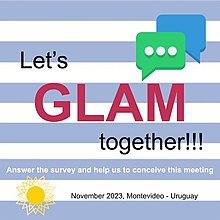
In order to present the grant application to the Wikimedia Foundation, we need to conduct an engagement survey to understand better how we can build a useful program that makes a good use for our in-person time.
The survey is available in the three languages that we are planning to have at the conference, Spanish, Portuguese & English.
Fill in the GLAM Wiki 2023 ENGLISH survey here.
Conteste la encuesta para GLAM Wiki 2023 en ESPAÑOL aquí.
Responda a pesquisa para GLAM Wiki 2023 em PORTUGUÊS aqui.
Please fill in the survey no later than January 15 and help us by spreading the word among your communities. Here we have crafted a message in the three languages if you want to help us spreading the word.
Small FAQ about the GLAM Wiki Conference 2023
Below we aim to answer some questions that we have received while distributing the survey. If you have any other question, please reach out to me through my talk page or shoot me an email at eheidel [at] wikimedistas.uy.
What's the GLAM Wiki Conference?
The GLAM Wiki Conference is a global conference for people dedicated to cultural heritage and Wikimedia communities & tools. The term "GLAM" comes from the acronym "Galleries, Libraries, Archives and Museums", but the communities of volunteers and professionals doing GLAM Wiki activities don't have to be working at an institution to be working with cultural heritage. Throughout three days, cultural heritage professionals, knowledge activists, Wikimedia volunteers and movement organizers working with cultural heritage and Wikimedia projects, come together to discuss topics such as:
- Open access to cultural heritage;
- Wikimedia tools for doing batch uploads, multimedia & content donations, and more;
- Innovative content campaigns to create awareness of the importance of cultural heritage around the world;
- Ongoing digitization efforts;
- Marginalized and underrepresented knowledge;
- Lessons learned from GLAM collaborations;
- ...and much more!
This conference was organized first in 2009 in Australia, and held in several other places afterwards, with the last one being held at Tel Aviv, Israel, in 2018. For a full (unofficial) list, see: GLAM Conferences.
The conference was planned to take place again in 2021, which couldn't happen because of the pandemic.
Why Latin America? Why Uruguay?
If our grant proposal gets approved, this would be the first time the GLAM Wiki Conference takes place in Latin America. This would be a huge opportunity for the Latin America communities that have been working on GLAM-related projects for a long time now bringing innovative approaches, such as the digitization program by Wikimedia Argentina, the capacity building initiatives by Wikimedia Chile & Wikimedistas de Uruguay, or the content campaigns to highlight the intangible cultural heritage of different States of Brazil by Wiki Movimento Brazil.
Wikimedia communities in Latin America have been a key partner to promote open access to cultural heritage across the region, and by organizing the GLAM Wiki Conference in Uruguay, we expect to create more opporutnities, articulations and a common goal for the region, while connecting with the global GLAM Wiki conversation.
At what stage of the planning process are you at?
Here is a brief outline of our current planning and calendar:
- Distributing Engagement Survey (required by the Wikimedia Foundation to present a grant proposal) till January 15th.
- Preparing proposal to be submitted by beginning of February 2023. People will be able to leave comments on the Talk page of the proposal.
- Proposal gets accepted or rejected by March 2023.
- If the proposal gets accepted, here's a (very) rough timeline for the Conference:
- April: Call for Program Committee members.
- May-June: Call for Proposals; Call for Scholarships; Call for volunteers.
- June-August: Proposals & scholarships accepted.
- September-October: Final program announced.
- November: Conference takes place!
I want to volunteer at the conference. How can I do it?
We are still at the planning stage. However, if you are interested in volunteering at the GLAM Wiki Conference, we are collecting expressions of interest by individuals. Just send Scann an email to eheidel [at] wikimedistas.uy if you would like to volunteer.
Are there going to be scholarships to attend to the GLAM Wiki Conference?
Yes, this is in our budget proposal. We expect to be offering full and partial scholarships for those interested in attending. While we can't guarantee right now how many scholarships there will be available, we expect to offer a similar amount to the scholarships allocated at GLAM Wiki Israel (a total of 45 scholarships were granted). We expect to offer scholarships to people coming mainly from underrepresented regions of the world.
Why an in-person event?
Great question! There are several concerns around doing an in-person event, from the carbon footprint to the need to allow for diversity & inclusion. We understand all these concerns, but we believe it's still very important to have in-person meetings to allow for in-depth conversations and problem solving activities that are otherwise hard to achieve online. However, in planning for the conference, we will do our best to incorporate online elements and allow for conversations to take place before the conference, in order to make the best use of our time while in person.
How can I recieve updates about the GLAM Wiki Conference 2023?
We will be distributing information through the traditional channels: this newsletter, the GLAM-Wiki Telegram group, the various GLAM mailing lists... if you are not familiar with any of these channels, leave me a message on my talk page.
WikiConference North America 2022; Punk Wikipedia Edit-a-thon; Kensho Technologies Impact-a-thon
WikiConference North America 2022
OpenStreetMap USA, and Wikimedia North America held a conference, WikiConference North America / Mapping USA.
There were remote meetups in Indianapolis, New York City, and Washington, D.C.
Punk Wikipedia Edit-a-thon
University of Maryland College Park, and Wikimedia DC held a workshop, University of Maryland: Punk Wikipedia Edit-a-thon
-
Bad Brains 1983
Kensho Technologies Impact-a-thon
Kensho Technologies and Wikimedia DC held a workshop, Kensho Wikipedia Edit-a-thon
We need your opinion: GLAM Wiki Conference 2023 & Your Favorite Tools
In the upcoming month (December 2022), two important surveys are held for GLAM-Wiki volunteers and GLAM staff. Make sure to fill them both in!
Survey 1: GLAM Wiki Conference 2023!

Wikimedistas de Uruguay is planning to organize the GLAM Wiki Conference in November 2023 in Montevideo, Uruguay, with the invaluable help of Wikimedia Argentina, Wikimedia Chile, Wiki Movimento Brazil, and WMF.
In order to present the grant application to the Wikimedia Foundation, we need to conduct an engagement survey to understand better how we can build a useful program that makes a good use for our in-person time.
The survey is available in the three languages that we are planning to have at the conference, Spanish, Portuguese & English.
Fill in the GLAM Wiki 2023 ENGLISH survey here.
Conteste la encuesta para GLAM Wiki 2023 en ESPAÑOL aquí.
Responda a pesquisa para GLAM Wiki 2023 em PORTUGUÊS aqui.
Please fill in the survey no later than January 15 and help us by spreading the word among your communities. Here we have crafted a message in the three languages if you want to help us spreading the word.
Survey 2: your favorite tools!

The Content Partnerships Hub (by Wikimedia Sverige) wants to help support the most important tools used in content partnerships - making sure these tools stay active and maintained.
We are now running a survey to prioritize the most important tools in this area. If you do Wikimedia content partnerships (including with GLAM partners), then we would like to know: what are the most important Wikimedia tools for your work?
Fill in the tools prioritization survey here.
You can also help by translating this survey's questions to your language! You will find instructions here on meta.wikimedia.org.
This survey will run until January 8, 2023. We will do a first (internal and temporary) review of the results on December 14, so don't hesitate to respond!
Survey: your favorite tools
Survey: your favorite tools

The Content Partnerships Hub is exploring how it can help to support strategically important tools used in content partnerships - making sure these tools stay active and maintained.
We are now running a survey to prioritize the most important tools in this area. Do you work on content partnerships in the Wikimedia movement (collaboration on content in Wikimedia projects, with external partners, such as GLAMs and other organizations), either as a Wikimedian or as staff of an external partner? Then we would like to know: what are the most important Wikimedia tools for your work?
You can fill in the survey here.
You can also help by translating the survey questions to your language! You will find instructions here on meta.wikimedia.org.
This survey will run until January 8, 2023. We will do a first (internal and temporary) review of the results on December 14, so don't hesitate to respond!
December's GLAM events
| <<< previous month | December 2022 | next month >>> | ||||
|---|---|---|---|---|---|---|
| Monday | Tuesday | Wednesday | Thursday | Friday | Saturday | Sunday |
| 28 |
29 |
30 | 1 |
2 |
3 WikiSource in Uganda In-person event
|
4 |
| 5 |
6 |
7 |
8 WikiSource in Uganda Online launch & training
|
9 |
10 |
11 |
| 12 |
13 |
14 |
15 | 16 | 17 |
18 |
| 19 |
20 |
21 |
22 |
23 |
24 |
25 |
| 26 |
27 |
28 |
29 |
30 |
31 | 1 |


